ANTON CHEKHOV ~ ON LIFE


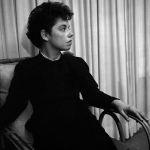
“I am a writer and I want to write.” ― Jane Bowles Fear and Hope “Like most people, you
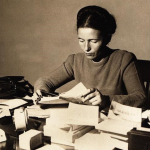
THE SIMONE DE BEAUVOIR EFFECT “I am incapable of conceiving infinity, and yet I do not accept finity.” SIMONE
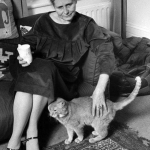
ONE WAY TO READ A BOOK In the opinion of the famous writer Doris Lessing there is only one

“Moreover, probably owing to excessive self-consciousness, perhaps as the result of the generally unfortunate cast of my personality, there existed between my thoughts and feelings, and the expression of those feelings and thoughts, a sort of inexplicable, irrational, and utterly insuperable barrier; and whenever I made up my mind to overcome this obstacle by force, to break down this barrier, my gestures, the expression of my face, my whole being, took on an appearance of painful constraint. I not only seemed, I positively became unnatural and affected. I was conscious of this myself, and hastened to shrink back into myself. Then a terrible commotion was set up within me. I analysed myself to the last thread, compared myself with others, recalled the slightest glances, smiles, words of the people to whom I had tried to open myself out, put the worst construction on everything, laughed vindictively at my own pretensions to ‘be like every one else,’—and suddenly, in the midst of my laughter, collapsed utterly into gloom, sank into absurd dejection, and then began again as before—went round and round, in fact, like a squirrel on its wheel. Whole days were spent in this harassing, fruitless exercise.”
― Ivan Turgenev, Diary of a Superfluous Man

“I am a writer and I want to write.” ― Jane Bowles Fear and Hope “Like most people, you

THE SIMONE DE BEAUVOIR EFFECT “I am incapable of conceiving infinity, and yet I do not accept finity.” SIMONE

ONE WAY TO READ A BOOK In the opinion of the famous writer Doris Lessing there is only one

“The tongue can conceal the truth, but the eyes never! You’re asked an unexpected question, you don’t even flinch, it takes just a second to get yourself under control, you know just what you have to say to hide the truth, and you speak very convincingly, and nothing in your face twitches to give you away. But the truth, alas, has been disturbed by the question, and it rises up from the depths of your soul to flicker in your eyes and all is lost.”
― Mikhail Bulgakov, The Master and Margarita

This intense novel is about a young mother and wife called Zoe Kruller, who is brutally murdered. It uses mixed storylines

“You can’t buy happiness, but you can buy books and that’s kind of the same thing.” Anonymous Girl Reading

“I am a writer and I want to write.” ― Jane Bowles Fear and Hope “Like most people, you


“I am a writer and I want to write.” ― Jane Bowles Fear and Hope “Like most people, you

THE SIMONE DE BEAUVOIR EFFECT “I am incapable of conceiving infinity, and yet I do not accept finity.” SIMONE

ONE WAY TO READ A BOOK In the opinion of the famous writer Doris Lessing there is only one


“I am a writer and I want to write.” ― Jane Bowles Fear and Hope “Like most people, you

THE SIMONE DE BEAUVOIR EFFECT “I am incapable of conceiving infinity, and yet I do not accept finity.” SIMONE

ONE WAY TO READ A BOOK In the opinion of the famous writer Doris Lessing there is only one


MARIA YAKUNCHIKOVA (1870-1902) WOMEN WITH A PASSION FOR ART The first female artist I want to introduce in the series
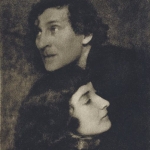
MARC AND BELLA CHAGALL ~ A COLORFUL LOVE “In our life there is a single color, as on an artist’s
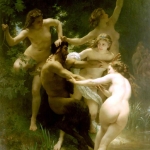
WILLIAM BOUGUEREAU AND HIS PASSION FOR PAINTING “Each day I go to my studio full of joy; in the evening

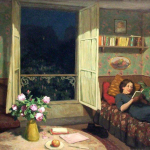
Series Women and their Passion for Books “What on earth could be more luxurious than a sofa, a book, and

“To love makes one solitary, she thought.” Virginia Woolf, Mrs Dalloway (1925)

“I am a dreamer. I know so little of real life that I just can’t help re-living such moments as
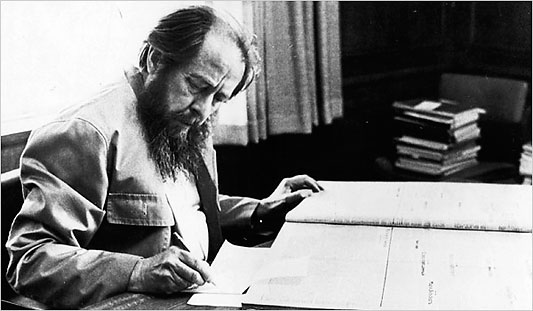
“Own only what you can always carry with you: know languages, know countries, know people. Let your memory be your travel bag.”
― Aleksandr I. Solzhenitsyn
Aleksandr Isayevich Solzhenitsyn ; 11 December 1918 – 3 August 2008) was a writer, who, through his often-suppressed writings, helped to raise global awareness of the gulag, the Soviet Union’s forced labor camp system – particularly in The Gulag Archipelago and One Day in the Life of Ivan Denisovich, two of his best-known works. Solzhenitsyn was awarded the Nobel Prize in Literature in 1970. He was expelled from the Soviet Union in 1974 but returned to Russia in 1994 after the Soviet system had collapsed

“I am a writer and I want to write.” ― Jane Bowles Fear and Hope “Like most people, you

THE SIMONE DE BEAUVOIR EFFECT “I am incapable of conceiving infinity, and yet I do not accept finity.” SIMONE

ONE WAY TO READ A BOOK In the opinion of the famous writer Doris Lessing there is only one
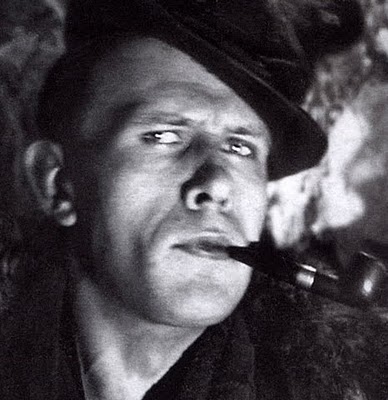
Daniil invented the pseudonym Kharms while attending high school at the prestigious German “Peterschule”. While at the Peterschule, he learned the rudiments of both English and German, and it may have been the English “harm” and “charm” that he incorporated into “Kharms”.rs. It is rumored that he scribbled the name Kharms directly into his passport.
In 1924, he entered the Leningrad Electrotechnicum, from which he was expelled for “lack of activity in social activities”. After his expulsion, he gave himself over entirely to literature. He joined the circle of Aleksandr Tufanov, a sound-poet, and follower of Velemir Khlebnikov’s ideas of zaum (or trans-sense) poetry. He met the young poet Alexander Vvedensky at this time, and the two became close friends and inseparable collaborators.
In 1927, the Association of Writers of Children’s Literature was formed, and Kharms was invited to be a member. From 1928 until 1941, Kharms continually produced children’s works and had a great success.
In 1928, Daniil Kharms founded the avant-garde collective OBERIU, or Union of Real Art. He embraced the new movements of Russian Futurism laid out by his idols, Khlebnikov, Kazimir Malevich, and Igor Terentiev, among others. Their ideas served as a springboard. His aesthetic centered around a belief in the autonomy of art from real world rules and logic, and the intrinsic meaning to be found in objects and words outside of their practical function.
By the late 1920s, his antirational verse, nonlinear theatrical performances, and public displays of decadent and illogical behavior earned Kharms — who always dressed like an English dandy with a calabash pipe — the reputation of being a talented but highly eccentric “fool” or “crazy-man” in Leningrad cultural circles.
Even then, in the late 20s, despite rising criticism of the OBERIU performances and diatribes against the avant-garde in the press, Kharms nurtured a fantasy of uniting the progressive artists and writers of the time (Malevich, Filonov, Terentiev, Vladimir Mayakovsky, Kaverin, Zamyatin) with leading Russian Formalist critics (Tynianov, Shklovsky, Eikhenbaum, Ginzburg, etc.,) and a younger generation of writers (all from the OBERIU crowd—Alexander Vvedensky, Konstantin Vaginov, Nikolai Zabolotsky, Igor Bakhterev), to form a cohesive cultural movement of Left Art. Needless to say it didn’t happen that way.
Kharms was arrested in 1931 together with Vvedensky, Tufanov and some other writers, and was in exile from his hometown (forced to live in the city of Kursk) for most of a year. He was arrested as a member of “a group of anti-Soviet children’s writers”, and some of his works were used as an evidence. Soviet authorities, having become increasingly hostile toward the avant-garde in general, deemed Kharms’ writing for children anti-Soviet because of its absurd logic and its refusal to instill materialist and social Soviet values.
He continued to write for children’s magazines when he returned from exile, though his name would appear in the credits less often. His plans for more performances and plays were curtailed, the OBERIU disbanded, and Kharms receded into a very private writing life.

“I am a writer and I want to write.” ― Jane Bowles Fear and Hope “Like most people, you

THE SIMONE DE BEAUVOIR EFFECT “I am incapable of conceiving infinity, and yet I do not accept finity.” SIMONE
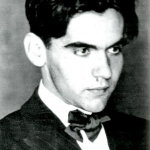
Federico Garcia Lorca “Let there be a landscape of open eyes and bitter wounds on fire. No one is sleeping


MARIA YAKUNCHIKOVA (1870-1902) WOMEN WITH A PASSION FOR ART The first female artist I want to introduce in the series

MARC AND BELLA CHAGALL ~ A COLORFUL LOVE “In our life there is a single color, as on an artist’s

WILLIAM BOUGUEREAU AND HIS PASSION FOR PAINTING “Each day I go to my studio full of joy; in the evening